
|
Astronomy Picture Of the Day (APOD)
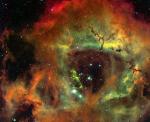 The Rosette Nebula in Hydrogen, Oxygen, and Sulfur
The Rosette Nebula in Hydrogen, Oxygen, and Sulfur
11.01.2000
The Rosette Nebula is a large emission nebula located 3000 light-years away. The great abundance of hydrogen gas gives NGC 2237 its red color in most photographs. The wind from the open cluster of stars known as NGC 2244 has cleared a hole in the nebula's center.
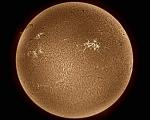 Brown Sun Bubbling
Brown Sun Bubbling
10.01.2000
Our Sun may look like all soft and fluffy, but its not. Our Sun is an extremely large ball of bubbling hot gas, mostly hydrogen gas. The above picture was taken in a specific color of light emitted by hydrogen gas called Hydrogen-alpha.
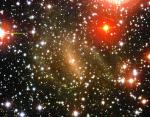 Galaxy Dwingeloo 1 Emerges
Galaxy Dwingeloo 1 Emerges
9.01.2000
Sometimes you can't see the forest for the trees. But if you look closely at the center of the above photograph, you will see a whole spiral galaxy behind the field of stars.
 Albert Einstein Describes Space and Time
Albert Einstein Describes Space and Time
8.01.2000
Albert Einstein (1879-1955) is considered by many the greatest astrophysicist and single most significant Person of the 20th Century. He is pictured here in the Swiss Patent Office where he did much of his defining work.
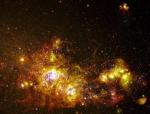 NGC 4214: Star Forming Galaxy
NGC 4214: Star Forming Galaxy
7.01.2000
Dazzling displays of star formation abound across the face of galaxy NGC 4214, a mere 13 million light-years away in the northern constellation Canes Venatici. While this 1997 Hubble Space Telescope image shows...
 Mars in the New Year
Mars in the New Year
6.01.2000
Many will long remember where they were and what they were doing when the calendar rolled over to the year 2000. On Mars, of course, that date was nothing special and the Mars Global Surveyor spacecraft continued with business as usual - systematically recording images of the Red Planet from orbit.
 Earth, Moon, Hubble
Earth, Moon, Hubble
5.01.2000
The Space Shuttle Discovery Crew was fortunate enough to witness one of the brighter full moon's from orbit two weeks ago during their mission to fix the Hubble Space Telescope. Pictured...
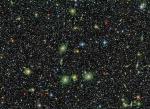 Galaxies Cluster Toward the Great Attractor
Galaxies Cluster Toward the Great Attractor
4.01.2000
Galaxies dot the sky like jewels in the direction of a mass so large it is known simply as the Great Attractor. The galaxies pictured above are part of a cluster of galaxies called ACO 3627 near the center of the Great Attractor.
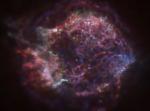 Cas A Supernova Remnant in X Rays
Cas A Supernova Remnant in X Rays
3.01.2000
The complex shell of a star seen to explode 300 years ago is helping astronomers to understand how that star exploded. The above recently released image of supernova remnant Cassiopeia A (Cas A) shows unprecedented detail in three X-ray colors.
 The Largest Rock Known
The Largest Rock Known
2.01.2000
There, that faint dot in the center - that's the largest rock known. It is larger than every known asteroid, moon, and comet nucleus. It is larger than any other rocky planet. (Nobody knows...
|
January February March April May June July August September October November December |
|||||||||||||||||||||||||||||||||||||||||||||||||